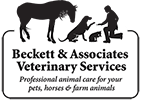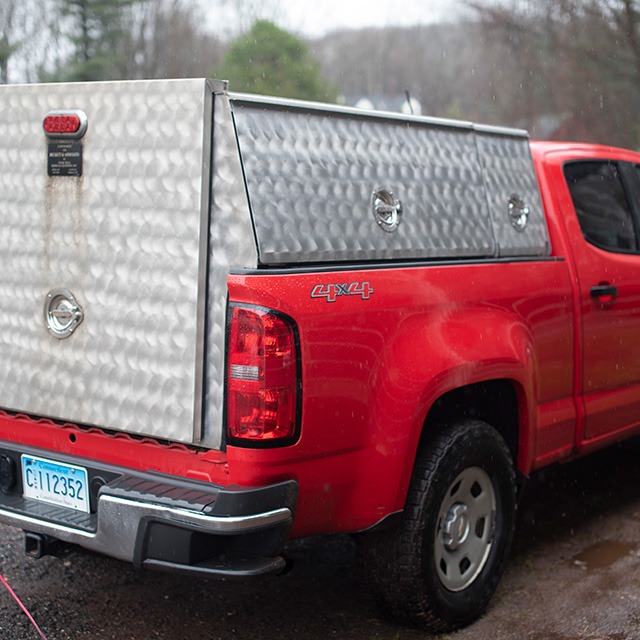Equine Veterinary Services
Equine Veterinary Services
For our Equine patients, we offer farm calls and trailer in appointments. Our veterinarians are well prepared to handle any type of call from physical exam with vaccinations, annual dental care, to alternative medicine and even 24 hour emergency services.
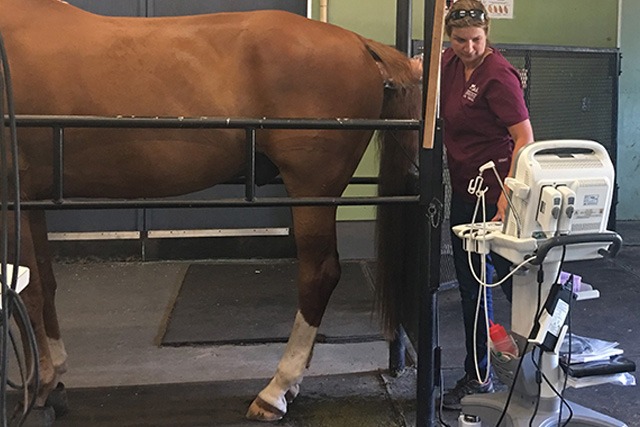
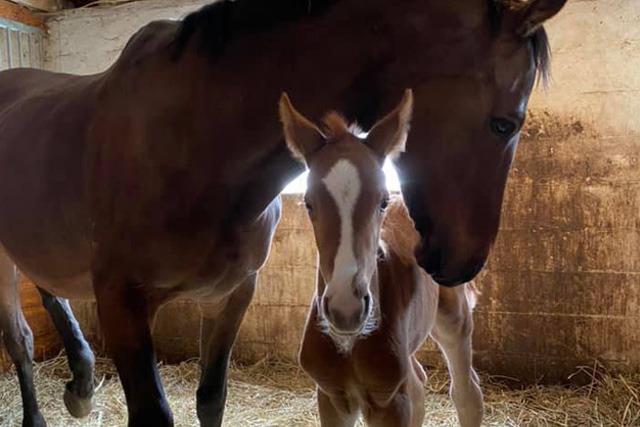
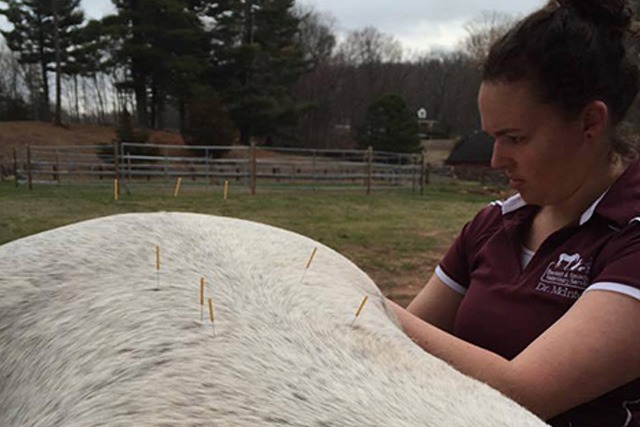
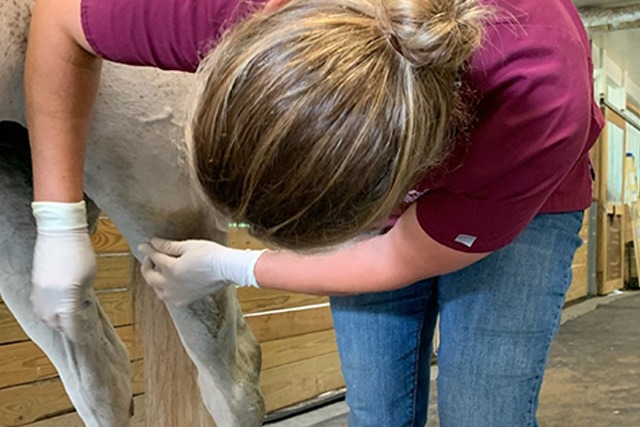
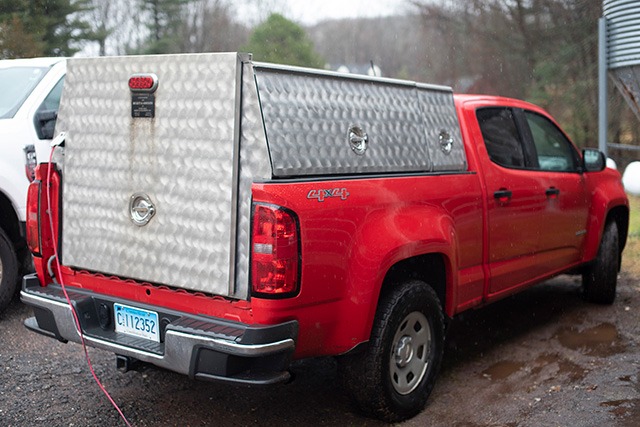
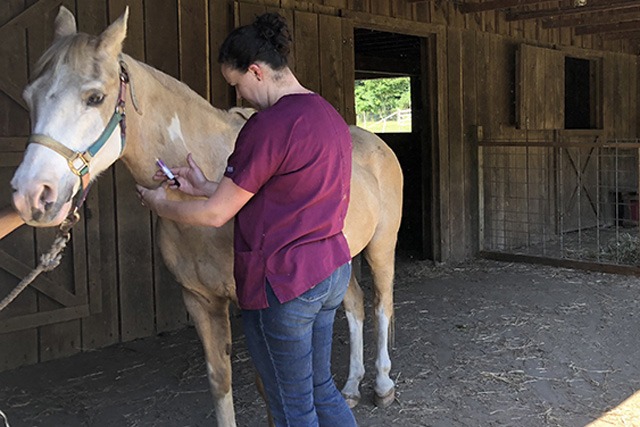
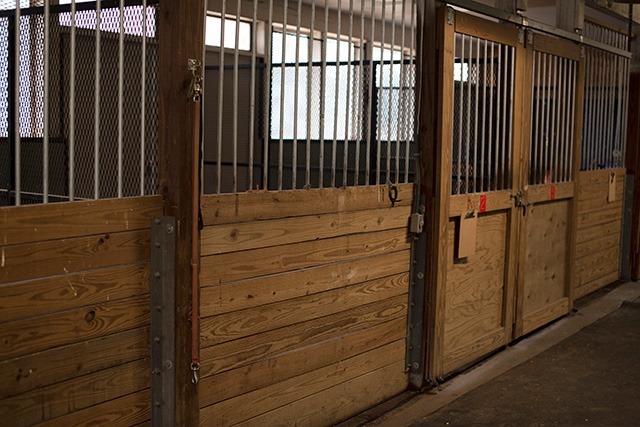
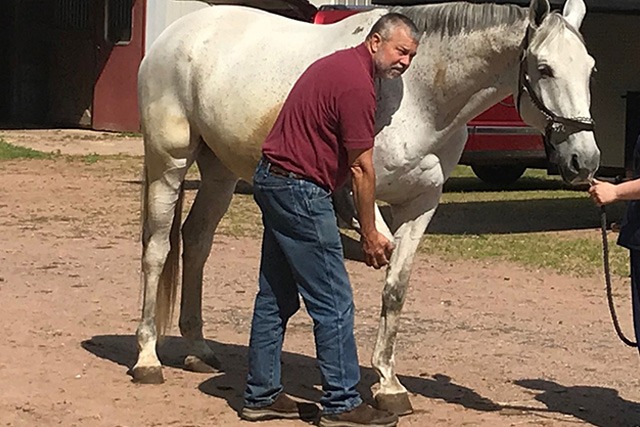
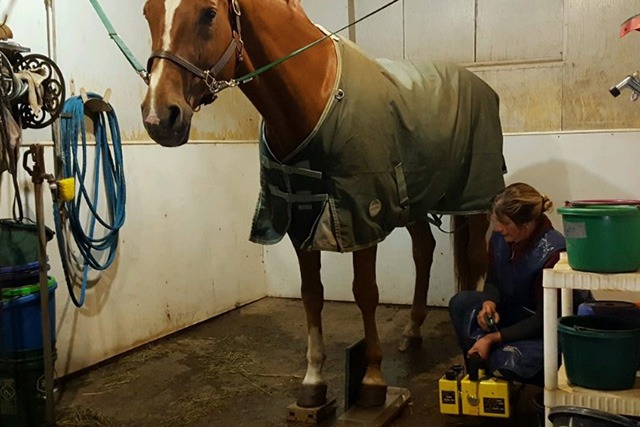
Click On A Veterinary Service Below To Learn More
Diagnostics
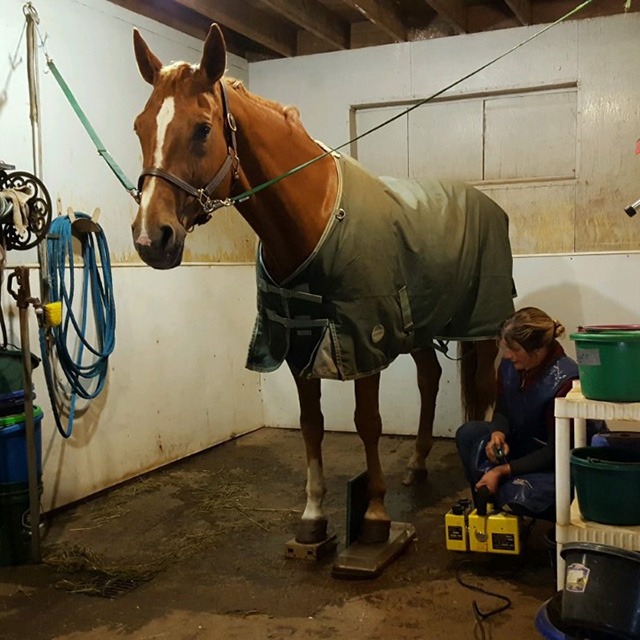
Diagnostics
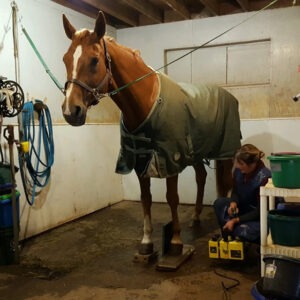 Equine Medical Diagnostics:
Equine Medical Diagnostics:
- We have many diagnostic tools to better access your horse on the farm and get quick answers. We also have a full large animal hospital with multiple stalls and IV fluid therapy capabilities.
Equine Bloodwork:
- We offer in-clinic blood work for patients who are medically ill or will be undergoing an anesthetic procedure. Our technicians have the ability to run multiple tests on our in-house equipment, which allows our doctors to diagnose and treat many conditions before the patient leaves our care.
We also offer a wide range of laboratory testing that we can send out for further analysis, as needed.
Complete Blood Count (CBC):
- This screen can help detect disorders of the red blood cells, white blood cells and platelets. A CBC may detect early signs of anemia, inflammation, infection and certain types of neoplasia.
Chemistry Panel:
- This chemistry panel looks at various protein and enzyme levels as well as basic electrolytes in the blood. It is a broad panel that measures several organ values including: kidney, liver and pancreas. Many disease processes can cause increases in one or more of these values early on, so monitoring these levels helps us intervene earlier.
Lactate Blood Level:
- This test looks at the amount of lactate in the blood and can be performed in the stall (on farm calls), to give an indication of how severe a colic is.
Equine Ultrasound:
- Our doctors may recommend an ultrasound for your horse to get a better evaluation of the extent of an injury, the stage of a “heat” cycle or pregnancy, or to further evaluate colic. We carry a rectal, tendon and abdominal probe with us in our farm truck at all times.
Ultrasound lets us measure the size of follicles on an ovary, evaluate their structure, and identify isolated or focal lesions within the uterus. Tendons and ligaments are frequent areas of injury in horses, and these structures can be better evaluated using ultrasound. This form of imaging can help determine the extent of damage and allow us to give a better prognosis as well as monitor healing.
Equine Radiology:
- We have a portable digital x-ray system for use on your farm. Digital radiographs allow our doctors to diagnose problems quickly, leading to faster and more effective treatment.
Digital radiography technology also enables our doctors to more seamlessly consult with specialists on certain cases and to send copies of your animal’s radiographs with you for your records.
Dentistry
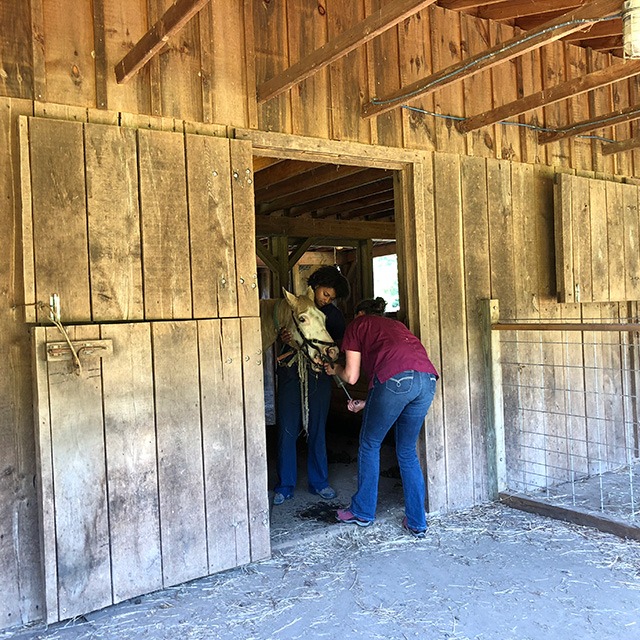
Dentistry
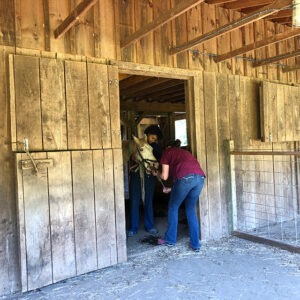 Routine dental care is a critical part of routine care for horses in order to keep them more comfortable, help them feed more efficiently, enable optimal performance, and ultimately prolong their lives.
Routine dental care is a critical part of routine care for horses in order to keep them more comfortable, help them feed more efficiently, enable optimal performance, and ultimately prolong their lives.
Our doctors perform regular dental floating including correction of points, hooks, ramps and wave mouth abnormalities. We also offer incisor realignment, woof teeth extractions and molar extractions.
Our doctors use a full mouth speculum and a combination of hand floating and electric floating to correct your horses’ occlusion. Signs of abnormal tooth occlusion can include avoidance of the bite when being ridden, head tossing and “quidding” or dropping of feed while eating.
Dental care is generally recommended on an annual or bi-annual basis depending on the abnormalities present in a given horse’s mouth. Our doctors can perform routine dental care on-site at your farm, for your convenience.
Integrative Medicine
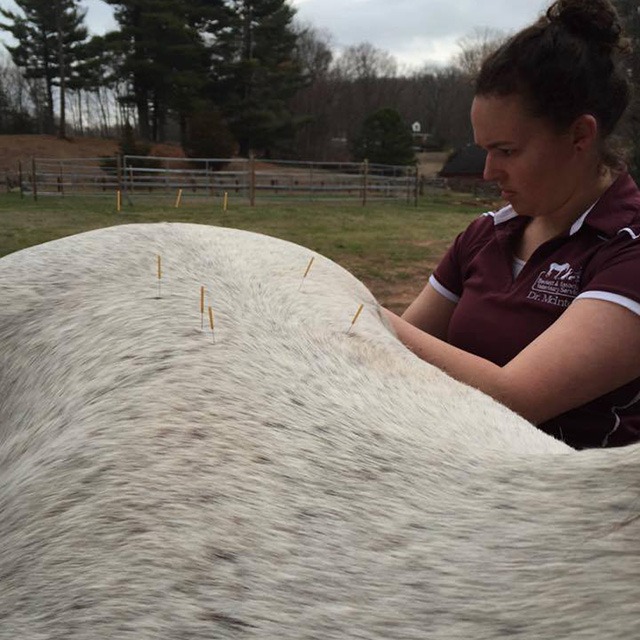
Integrative Medicine
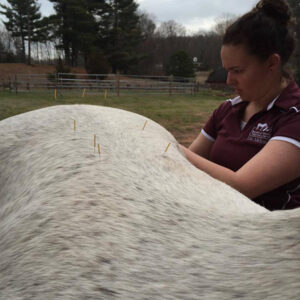 Our equine veterinary team always seeks the least invasive method possible to keep your horse in optimal health.
Our equine veterinary team always seeks the least invasive method possible to keep your horse in optimal health.
Our comprehensive equine veterinary services include alternative therapies that can complement, enhance, or in some cases, even replace the conventional medical approach. Our medical team tailors each horse’s treatment plan in order to provide personalized solutions.
Equine Acupuncture:
- We are proud to offer acupuncture for our equine patients, which can provide rapid pain relief and many other benefits.
Two of our doctors perform equine acupuncture and perform traditional, injectable and electro-acupuncture therapies. The traditional technique involves inserting needles into distinct points with or without electrical stimulation. Whether its dry needle, an injection, or laser light, acupuncture is painless, and most of our patients get very relaxed during the procedure.
Acupuncture can help treat including musculoskeletal problems, neurological & gastrointestinal disorders, and many chronic conditions. It also has been used for performance enhancement and disease prevention, as it can stimulate the immune system.
Equine Chiropractic:
- The nervous system coordinates and regulates all of the organ systems in a horse. Equine Chiropractic focuses on the health of the nervous system and spine, because a healthy nervous system leads to a healthy body.
During Chiropractic treatment, our goal is to align your horse’s spinal column and other significant joints to reduce swelling and inflammation of the tissues that surround joint space.
Chiropractic therapy is a process which can restore a normal range of motion, while dramatically improving joint comfort, in our equine patients. Our doctors often use acupuncture and chiropractic together to better reduce pain and mobility, as well as to increase the stability of the musculoskeletal system.
Equine Laser Therapy:
- Laser Therapy is an effective, non-invasive way to deeply penetrate tissue without damaging it. The laser induces a biological response in cells called ‘photo-bio-modulation’ which increases blood flow, allowing blood vessels to dilate and bring oxygen and nutrients to the affected area rapidly. The result is often a significant reduction in pain & inflammation.
Laser Therapy can also remove cellular waste products derived from injured tissue while allowing your horse to experience immediate relief. For these reasons, Laser Therapy can also effectively increase the speed of healing in a horse post-surgery.
We often use our therapeutic laser in conjunction with acupuncture and traditional medicine to help chronic as well as acute conditions.
Equine Herbal Therapy:
- Herbs are plants that contain ingredients with active therapeutic properties, and they are the foundation for all pharmaceuticals. Just as humans can benefit from supplements and herbal therapies, our equine patients can too. The age-old adage “you are what you eat” is of particular significance here, as many foods cause a metabolic effect upon digestion.
In the late eighteenth century, advances in science enabled chemists to isolate and purify active ingredients in herbs. Today, significant research supports the use of herbs in equine veterinary medicine. The more it is practiced, the more industry protocols are emerging on which approaches work best for various conditions.
At Becket & Associates, we leverage your horse’s nutrition with herbal solutions to optimize metabolism and performance, and to improve their health and well-being overall.
Ophthalmology
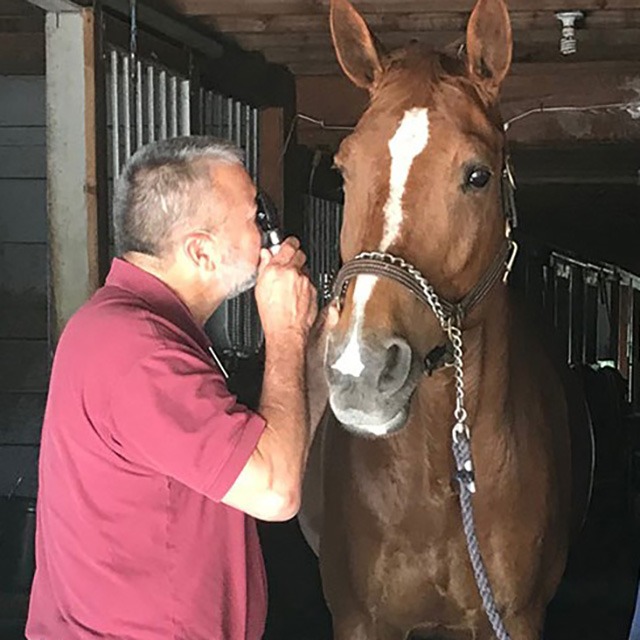
Ophthalmology
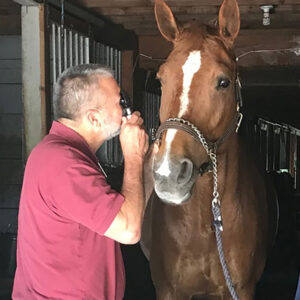 For our equine patients who need advanced ophthalmology services, we perform full eye examinations with a dilated retinal exam, treatment of uncomplicated corneal ulcers, conjunctivitis, recurrent uveitis and eosinophilic keratitis.
For our equine patients who need advanced ophthalmology services, we perform full eye examinations with a dilated retinal exam, treatment of uncomplicated corneal ulcers, conjunctivitis, recurrent uveitis and eosinophilic keratitis.
We also offer treatment of more complicated problems including fungal keratitis, stromal abscesses, and deep/complicated corneal ulcers with the use of subpalpebral lavage systems and infusion pumps.
We routinely perform standing surgeries including enucleation and third eyelid removal when needed. We also offer in-house hospital care for horses with conditions that need consistent intensive treatment or emergency situations involving trauma or laceration of the eyes.
Our primary goal with the ophthalmology care for our equine patients is to preserve their vision or help them return to vision, comfort, and ocular integrity.
Preventative
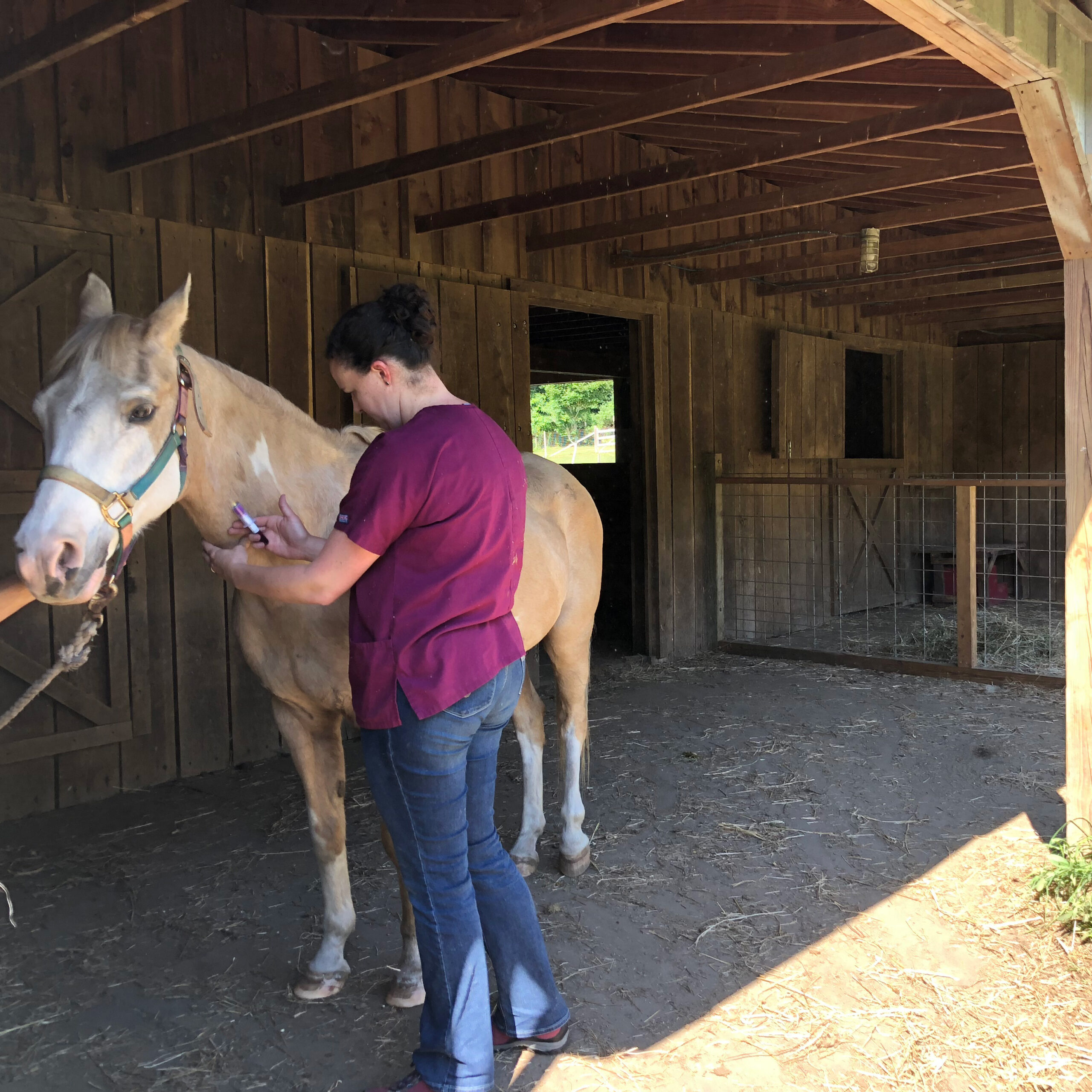
Preventative
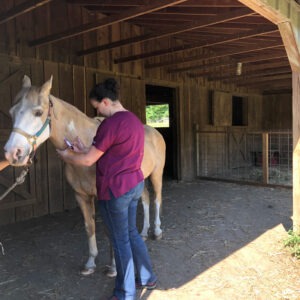 The physical exam is the basis for diagnosis and treatment of your horse. Our doctors perform a complete examination at least once a year, as well as any time the horse is brought in with a problem.
The physical exam is the basis for diagnosis and treatment of your horse. Our doctors perform a complete examination at least once a year, as well as any time the horse is brought in with a problem.
Doing a thorough examination even when there are no obvious problems allows us to determine whether a problem that surfaces later is indeed new, or the progression of an older condition. In addition, in animals with known abnormalities, such as heart murmurs or dental irregularities, regular exams allow us to chart the course of disease, and determine whether it is progressive or static.
Since your horse can’t always communicate if something is wrong, owner feedback and routine physical exams are vital for identifying problems. Our doctor will usually observe your horse walking in from the paddock or stall area, and take note of its attitude and any obvious abnormalities. Changes in weight, hair coat and general demeanor often provide clues about possible underlying diseases as well.
The physical exam includes the following:
- Listening to the heart and lungs with a stethoscope to check for abnormal heart rhythms or murmurs
- Listening to the abdomen to assess the movement of ingesta through the bowel
- Examining the eyes and ears for abnormalities in structure and indications of abnormal function
- Examining the mouth and teeth to ensure that the horse maintains normal occlusion and can chew its food properly
- Examining the hair coat for abnormal hair growth or evidence of skin infection and external parasites
- The horse’s temperature is taken to ensure there is no underlying infection prior to giving any vaccinations
Core Vaccinations:
- Tetanus
- Eastern/Western Encephalomyelitis (EEE/WEE)
- West Nile Virus (WNV)
- Rabies
Risk Based Vaccinations:
- Equine Herpes/RhinoVirus
- Influenza
- Potomac Horse Fever
- Strangles (Streptococcus equi)
Parasite Management:
- Good pasture/dry lot management is necessary to reduce parasite burdens
- Pick up and dispose of manure droppings on a regular basis in stalls and paddocks
- Harrow pastures regularly to break up manure piles and expose parasite eggs to the elements
- Rotate pastures by allowing other livestock to graze them, interrupting the life cycles of equine parasites
- Keep the number of horses per acre to a minimum to prevent overgrazing and reduce the fecal contamination
- Remove bot eggs quickly and regularly from the horse’s hair coat to prevent ingestion
Reproduction
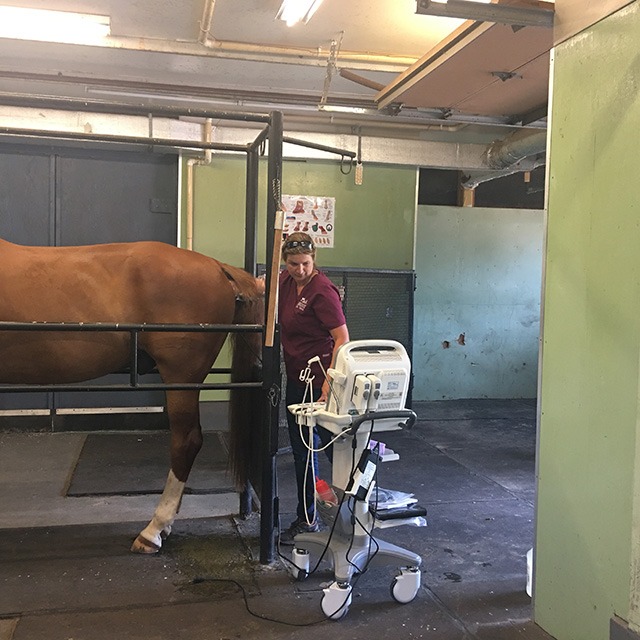
Reproduction
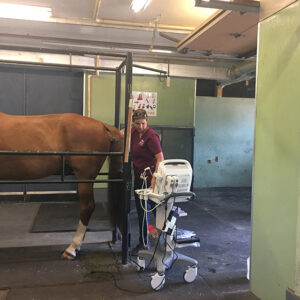 Breeding your mare is a big commitment, but our experienced veterinarians can help to ensure this process goes as smoothly and safely as possible.
Breeding your mare is a big commitment, but our experienced veterinarians can help to ensure this process goes as smoothly and safely as possible.
Prior to breeding your mare, we’ll perform a comprehensive reproductive evaluation on her, including a detailed ultrasound examination of her reproductive tract to assess her potential fertility. If possible or existing problems are identified, further diagnostics can be performed, including uterine culture and cytology, or endometrial biopsy.
We offer artificial insemination with chilled or frozen semen and can manage this for your mare either at your farm or at our breeding facility. For mares who are being bred to stallions with frozen semen, palpation and ultrasound examinations are recommended every 6 hours to allow us to accurately predict ovulation, which is easiest to manage at our clinic.
If your mare is a high-risk mare, or has a history of subfertility, we offer a range of management and therapeutic options to maximize her chances of becoming pregnant and maintaining her pregnancy to term.
Sports Medicine, Lameness
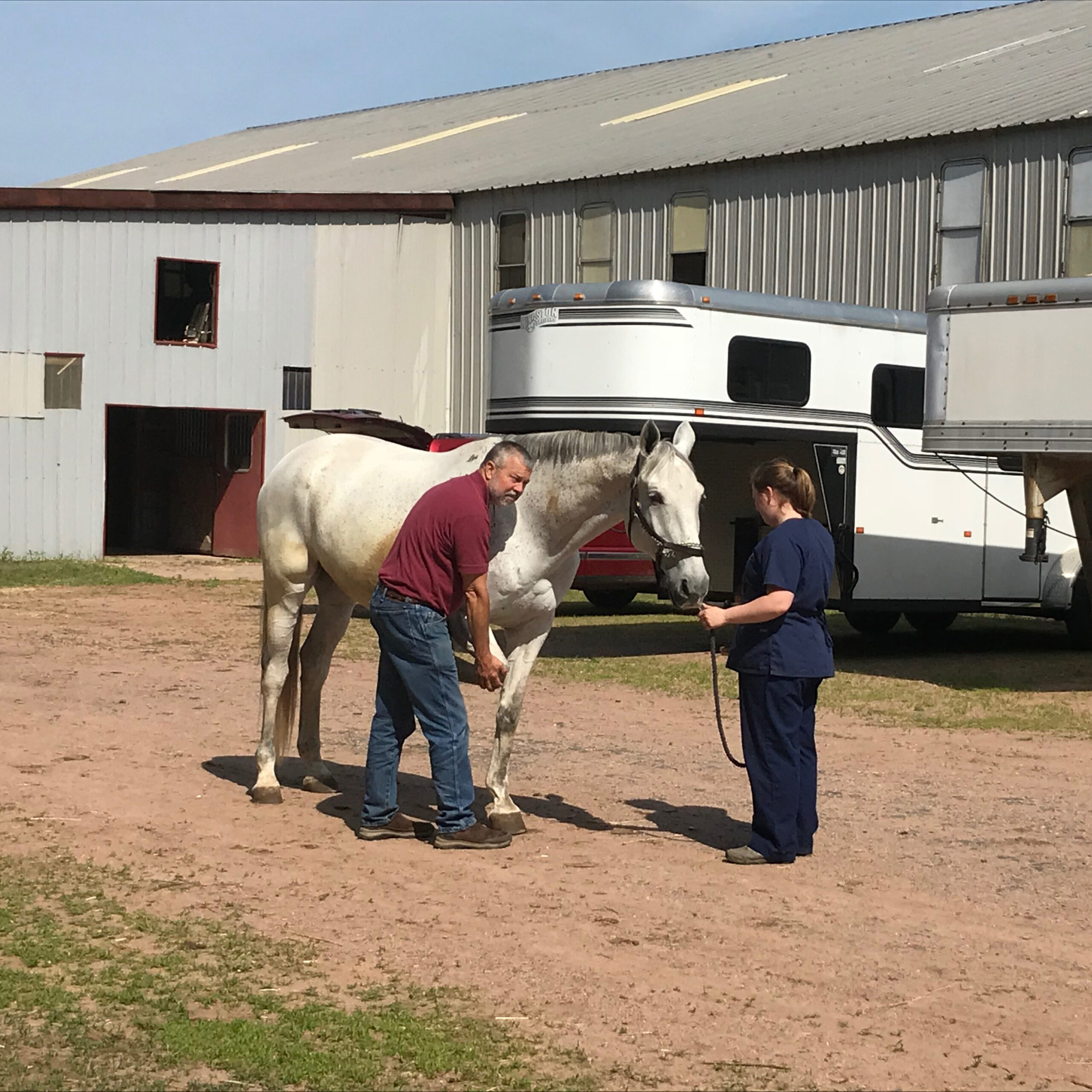
Sports Medicine and Lameness
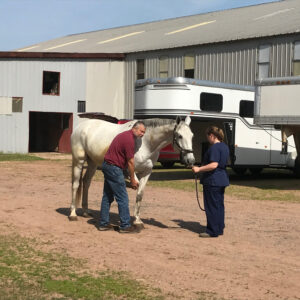 All lameness exams begin with a discussion of the horse’s history and a physical exam. Most exams include an evaluation of the horse in motion, in hand or under saddle, and flexion tests.
All lameness exams begin with a discussion of the horse’s history and a physical exam. Most exams include an evaluation of the horse in motion, in hand or under saddle, and flexion tests.
Digital radiography and ultrasound are often used to diagnose the lameness, and other diagnostic tools such as nerve and joint blocks can help to isolate the lameness. Treatment of lameness may include joint injections, laser therapy, acupuncture or chiropractic.
Pre-purchase exams include a thorough physical examination, an eye exam, a musculoskeletal evaluation, and a soundness evaluation via flexion tests. In addition to our basic pre-purchase exams, we encourage our clients to utilize our portable digital radiography and endoscopy services for further evaluation.
Surgery
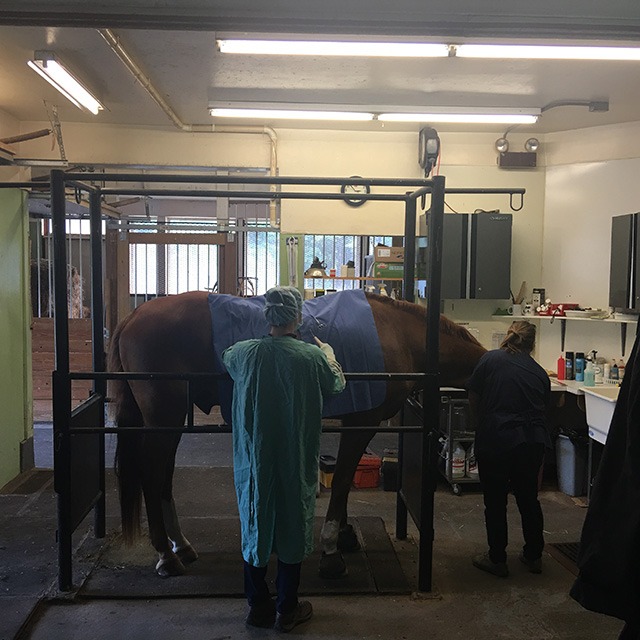
Surgery
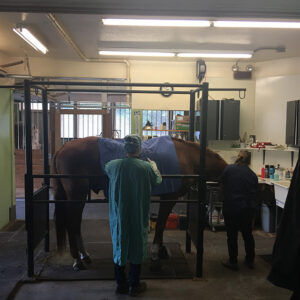 We understand that the prospect of surgery for your horse may be a bit frightening, but be assured that we only recommend surgeries when they are in the best interest of your animal.
We understand that the prospect of surgery for your horse may be a bit frightening, but be assured that we only recommend surgeries when they are in the best interest of your animal.
Beckett & Associates is equipped with an equine animal treatment area that includes stocks for use during standing surgical procedures and other treatments, as well as a padded recovery stall. Our equine veterinary team commonly performs castrations, hernia repairs, enucleations, and laceration repairs in our surgical facility.
We make sure to practice the most stringent surgical safety protocols that we can and believe it’s in our patient’s best interest to use a standing procedure whenever possible, to reduce the risk of anesthesia-related complications. For this reason, most large animal surgeries are performed on standing and awake patients.
We have a padded induction-recovery stall and several hospital stalls and routinely perform many minor surgical procedures on site without having to refer our clients to larger hospitals.
